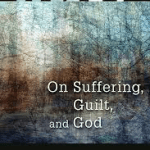A Theologian’s Journey
I have no idea how many, if any, of you are interested in this brief autobiographical reminiscence about my theological journey. But perhaps especially those of you reading “Why?” With me may be interested—in why (no pun intended) I find the book so fascinating and thought-provoking and even supportive of my own thoughts about God.
I grew up in a form of Christian life that, for the most part, anthropomorphized God. To us, God was very personal, although on human in Jesus Christ. All three persons of the Trinity were talked about as real persons—relatable to us, capable of being affected by us, more than willing and able to have real personal relationships with us that were interactive. Our prayers could make a difference in what God might do. God talked to us. We heard him if we listened.
Then I entered seminary and discovered that the mainline of traditional Christian theological thinking about God is different. God is self-sufficient, immutable, impassible, lives outside of time, cannot be affected by anything that happens inside of time. Not that all of my professors thought that way, but they certainly introduced me to theologians who were considered normative who thought that way.
That’s called “classical theism” and I found it appalling. So I took a course outside the seminary, through a Lutheran seminary extension at a nearby college, in process theology. I was equally appalled by process theology. The professor was a process theologian and promoted it heavily.
So I began a journey to find out if there were any “world class” theologians who were neither advocates of classical theism nor of process theology who believed in a personal, historical God, a God such as I read about in the Bible, a God who could really relate to us and let us affect him.
My discovery of such a theologian was Donald G. Bloesch. But the one who really met my need and opened my mind further was Robert Jenson. His book “God After God” was about the theology of Karl Barth but was really also Jenson’s own exposition of the historicity of God. From Jenson I moved on to Moltmann and Pannenberg and then began “collecting” theologians who appeared to me to emphasize God as one who can change, not had to change as in process theology, but could change.
Along that journey I found many non-liberal, non-traditional theologians who encourage me to re-embrace something of the God of my childhood and youth, a God who opens himself up to us and goes on a historical journey with us, a God who is in time with us (or we are in time with him) but not a God who is pathetically impotent to work miracles and assure an ending to history that is in accord with his will.
Some of the theologians who influenced me in this way, who, in one way or another, seemed to believe in and teach a “historical God,” were Emil Brunner, Karl Barth (debatable but at least in some places there), Juergen Moltmann, Wolfhart Pannenberg (at least before his ST appeared), Robert Jenson, Ted Peters, Hendrikus Berkhof, and then, of course, the open theists such as Clark Pinnock and others. I never “signed onto” open theism, but I agreed with their emphasis on God’s “historicity,” God with us.
I learned that in the “deep background” of all of this rethinking of God, away from classical theism, was G. W. F. Hegel. Or was it just an honest reading of the Bible? Or somehow both? I could never agree with Hegel about panentheism—that God is somehow necessarily dependent on the world. But I could believe that God always has as-yet-unfulfilled potential and is not “pure actuality with no potentiality” (as in Thomas Aquinas and most scholastic Christian thinkers). On the American side I discovered mostly philosophers (beyond the open theists and Robert Jenson) who helped me on my journey toward thinking of God as intensely personal and historical: Nicholas Wolterstorff, Keith Ward (British or Canadian, I’m not sure), Richard Kearney, and others.
Then I found Abram van de Beek’s “Why? On Suffering, Guilt and God” and persevered to the end. There I found something new and different, daring and risky, but seemingly, to me, taking the Bible’s account of God with utmost seriousness without being a fundamentalist. I was surprised to find that he was almost completely unknown outside of the Netherlands. In the book I “heard” the “voices” of Brunner, Berkhof, Vincent Brummer (another Dutch philosopher-theologian who takes God’s personhood and historicity very seriously). I found a helper on my journey.
I have no trouble now affirming that I believe that much of what is traditionally called “anthropomorphism” in the Bible was not intended to be interpreted figuratively as “mere anthropomorphism.” The God of the Bible is a God without philosophical simplicity (a philosophical-metaphysical construct), with timefullness, with a complex emotional life, who can be affected by us because he chooses to be so out of love.
*Note: If you choose to comment, make sure your comment is relatively brief (no more than 100 words), on topic, addressed to me, civil and respectful (not hostile or argumentative), and devoid of pictures or links.*














